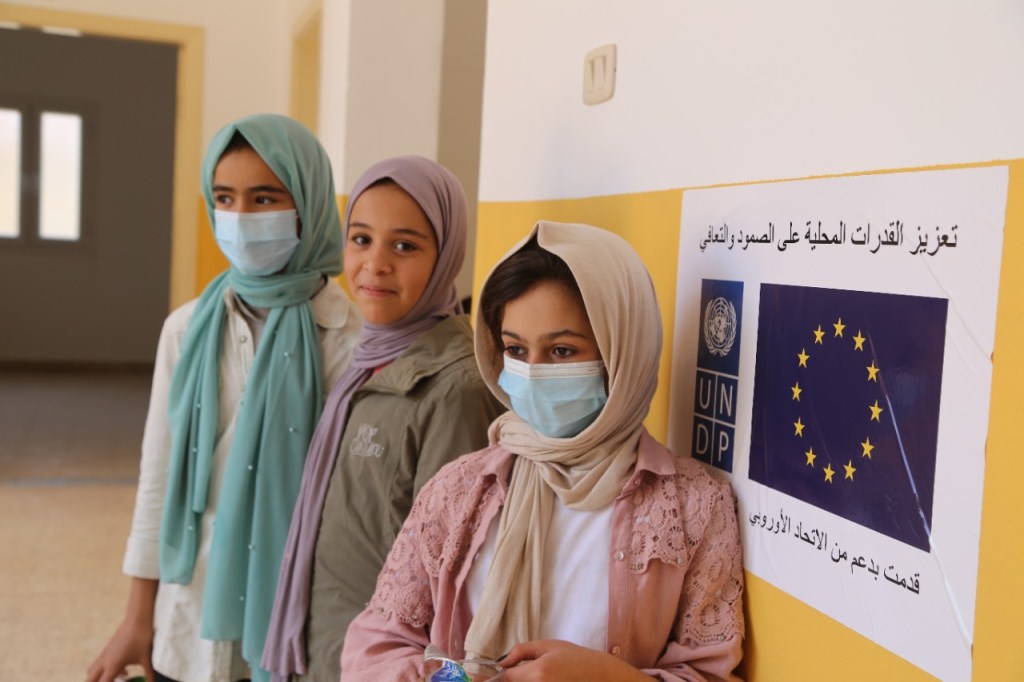Rebuilding futures: EU-UNDP inaugurate two schools in Sabratha
Two elementary and middle schools in Sabratha, together hosting 700 students, were handed over after undergoing substantial renovations.
As part of UNDP‘s Strengthening Local Capacities for Resilience and Recovery (SLCRRR), the upgrades have been financed by the European Union under the framework of the programme “Recovery, Stability and Socio-Economic Development in Libya – Baladiyati”.
The United Nations Development Programme (UNDP) renovated Al-Houria and Al-Tawila schools in Sabratha and handed them over today to the Sabratha Municipal Council in a ceremony that took place at Al-Tawila school.
Al-Tawila School is an elementary and middle school with 600 students located in the west of Sabratha city. The school was built in 1973 and has never been maintained. The one-story building consists of 12 classrooms as well as administration offices, a laboratory and washrooms, and was operating on two shifts – mornings and afternoons. However, the declining state of the school was affecting the learning process for both the students and the 100 teachers and employees who work there. After this renovation, the learning environment and experience for students and teachers alike will improve.
Al-Houria School is an elementary school with originally six classrooms located also in the west of Sabratha city. The 100 students who attended the school were learning in an inadequate environment, which caused health and safety risks for them and the teachers as the center was never maintained. The renovation work included not only maintenance work, but also the addition of four new classrooms, two washrooms, a small office, a principal office, students’ affairs and social workers office, chemistry lab room, computer lab, snack room and a school yard. After renovation, the school will be able to host more students who will learn in a suitable environment.
Mayor of Sabratha, Mr. Ramzi Masoud said: “We thank everyone who extended a helping hand and made these programmes possible. Supporting the ancient city of Sabratha means supporting a world heritage city, one which contains remains of ancient civilizations and one that has made its mark on human history. As people of Sabratha, we are supportive of any efforts that serve the city, whether international or local”.
“Modernizing schools and creating safe learning environments for children are crucial investments in Libya’s future,” said EU Ambassador José Sabadell. “We are glad that we could complete the important renovation of Al-Tawila and Al-Houria schools in Sabratha despite the additional difficulties posed by the ongoing COVID-19 pandemic. This project is a crucial part of the European Union’s ongoing support to Libyan municipalities in their efforts to improve public services.”
UNDP Resident Representative in Libya, Mr. Gerardo Noto, acknowledged: : ”Through the renovation of the Al-Tawila and Al-Houria schools in Sabratha, and with efforts from all partners, UNDP is moving forward in its commitment to ensuring all boys and girls in Libya have access to quality education in an environment which promotes effective learning outcomes. The role of education is key in the path towards peacebuilding in Libya.”
The rehabilitation of the schools is aligned with the UNDP’s SLCRR Project’s overall aim to strengthen municipalities’ capacity to improve people’s access to quality essential services including education, health, water and sanitation services.
Background:
The EU’s Baladiyati €50 million “Recovery, Stability and Socio-economic Development Programme” currently works with 24 municipalities across Libya with the aim to improve people’s access to quality public services such as education, health, water and sanitation. Baladiyati is implemented by the Italian development agency AICS, UNDP and UNICEF. It is the largest programme ever financed by the European Union in direct support of Libyan municipalities and of some of the most vulnerable communities in the country.
The programme in Libya is funded by the European Union through the Emergency Trust Fund for Africa, to improve living conditions and build resilience among vulnerable populations, including migrants, refugees, internally displaced people (IDPs), returnees and host communities.















